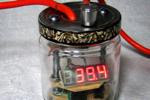French vineyard owners are returning to a slower pace of life by starting to export their wine by sailing boat - a method last used in the 1800s - to reduce their carbon footprint.
Later this month 60,000 bottles from Languedoc will be shipped to Ireland in a 19th-century barque, saving 18,375lb of carbon. Further voyages to Bristol, Manchester and even Canada are planned soon afterwards.
The three-mast barque Belem, which was launched in 1896, the last French merchant sailing vessel to be built, will sail into Dublin following a voyage from Bordeaux that should last about four days. The wines will be delivered to Bordeaux by barge using the Canal du Midi and Canal du Garonne, which run across southern France from Sète in the east, via Béziers in Languedoc. Each bottle will be labelled: 'Carried by sailing ship, a better deal for the planet.' Although the whole process will end up taking up to a week longer than a flight, it is estimated it will save 4.9oz of carbon per bottle.
Frederic Albert, founder of the shipping company Compagnie de Transport Maritime à la Voile (CTMV), said: 'My idea was to do something for the planet and something for the wines of Languedoc. One of my grandfathers was a wine-maker and one was a sailor.'
With French wine exports booming following a number of difficult years, Albert said some 250 producers in Languedoc alone were keen to use his ships.
Sunday, February 24, 2008
Wine by Boat
Eco-friendly French to ship their wine under sail60,000 bottles on a 19th-century barque from Bordeaux to Dublin is just the start
Saturday, February 23, 2008
Solar Power Cost
Salon magazine looks at the debate over the true cost of solar power. Not surprisingly, estimates are all over the place.
Meanwhile, Science Daily notes ways to improve solar efficiency.
Special Coating Greatly Improves Solar Cell Performance
ScienceDaily (Feb. 22, 2008) — The energy from sunlight falling on only 9 percent of California's Mojave Desert could power all of the United States' electricity needs if the energy could be efficiently harvested, according to some estimates. Unfortunately, current-generation solar cell technologies are too expensive and inefficient for wide-scale commercial applications.
A team of Northwestern University researchers has developed a new anode coating strategy that significantly enhances the efficiency of solar energy power conversion. A paper about the work, which focuses on "engineering" organic material-electrode interfaces in bulk-heterojunction organic solar cells, is published online in the Proceedings of the National Academy of Sciences.
Meanwhile, Science Daily notes ways to improve solar efficiency.
Special Coating Greatly Improves Solar Cell Performance
ScienceDaily (Feb. 22, 2008) — The energy from sunlight falling on only 9 percent of California's Mojave Desert could power all of the United States' electricity needs if the energy could be efficiently harvested, according to some estimates. Unfortunately, current-generation solar cell technologies are too expensive and inefficient for wide-scale commercial applications.
A team of Northwestern University researchers has developed a new anode coating strategy that significantly enhances the efficiency of solar energy power conversion. A paper about the work, which focuses on "engineering" organic material-electrode interfaces in bulk-heterojunction organic solar cells, is published online in the Proceedings of the National Academy of Sciences.
Tuesday, February 12, 2008
Green Design Winners
 This DIY device measures energy use.
This DIY device measures energy use.The Good Human looks at four designs that won in the recent Greener Gadgets Design Competition in New York City.
Friday, February 8, 2008
Subscribe to:
Posts (Atom)
